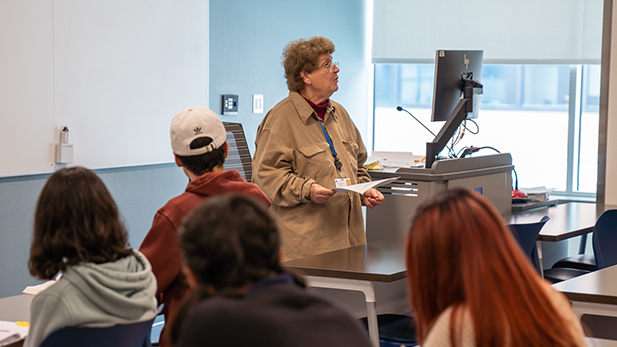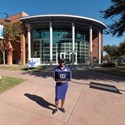SPC Faculty-Student Mentoring Program

Welcome to St. Philip's College's new faculty-student mentoring program.
The SPC faculty-student relationship is an important part of your time here. A student working with a faculty mentor and their student academic advisor will achieve the goal of college completion, university transfer or career employment more successfully.
Mission Statement
The mission of the St. Philip’s College Faculty-Student Mentoring (FSM) Program is to empower students to achieve 30 credit hours on the way to realizing the career pathway and transfer opportunities available to them.
Program Goal
The goal of the Faculty-Student Mentoring (FSM) Program at St. Philip’s College is to offer students the opportunity to establish an academic relationship with a faculty member. This faculty member (mentor) will meet with their assigned mentee throughout the semester to encourage and support their goals while attending St. Philip’s College. The faculty-student mentor will provide insight into the student’s academic success. Other focal points that are suggested for a mentor-mentee relationship will surround preparing the student for university transfer, aiding in refining workplace skills, and discussing career aspirations. Faculty mentees are assigned once a student has completed their first semester and/or has completed at least 15 earned hours.
What is Mentoring?Mentoring is a relationship built on trust in which a more experienced person guides and helps a less experienced person with education or career development. |
What to Expect
|
Benefits of Joining SPC's Mentoring ProgramMentors help students develop and achieve goals. These goals can focus on personal growth, career preparation, or successful transfer to another college program. Mentoring helps you become the best version of yourself. |
Join Our Mentoring ProgramStudents, if you are interested in a Faculty Mentor, please don't hesitate to sign up today! |
Student Resources
 |
As a St. Philip's College student, you have access to a wide variety of resources that can help you succeed academically and personally. These resources are designed to assist you in achieving your academic goals, making connections with your peers, and addressing any challenges you may face along the way. To find out more about the resources available to you, be sure to check out the list provided by the college. This list may include resources such as academic advising, tutoring services, career counseling, student organizations, and much more. By taking advantage of these resources, you can make the most out of your time at St. Philip's College and enhance your overall college experience. |
Helpful VideosIn order to navigate the Faculty Student Mentor process, it is helpful to be familiar with ACES and GPS. |
|
Quick Tutorial on Using ACES |
Quick Tutorial on Using GPS |
Faculty Resources
-
Contact List
We have an amazing group of Faculty Student Mentor volunteers. They are committed to mentoring students. This list will be updated regularly as more faculty members volunteer to step forward to mentor our SPC students. It is because of our Faculty Mentors that our program continues to grow. Thank you for your time.
Program organizational structure
Faculty Student Mentoring Program Coordinators:
- Jacqueline Stevenson, Assistant Professor
Occupational Therapy Assistant Program
spc-fsm@alamo.edu - Christopher Metsgar, Dean of Health Sciences
spc-fsm@alamo.edu
FSM Committee Membership (25+ employees):
- Chair: ThermaJean Jones, Interim Dean for Academic Success, Health Sciences
- Faculty
- Advising Staff
- Jacqueline Stevenson, Assistant Professor
-
- How does the mentoring program help faculty who want to be mentors?
- The Faculty-Student Mentoring Program at SPC facilitates mentoring relationships in the following ways:
- Assisting with matching students and faculty members;
- Providing a framework for a professional relationship that encourages goal setting and personal growth;
- Training faculty to effectively assist their mentees;
- Coordinating with advisors to ensure the best advice for the student.
- The Faculty-Student Mentoring Program at SPC facilitates mentoring relationships in the following ways:
- What are the expectations of faculty mentors?
- Choosing to be a Faculty Student Mentor requires a few manageable things from the mentor. Some of those things are listed below. In addition, many informational sessions, training, and special events are scheduled to help build the mentor’s knowledge and to collaborate with other mentors. Check out our college calendar for upcoming events.
Expectations of faculty with students:
- Faculty assigned up to 20 students (at a 1-hour estimate on emails and 30-minute sessions anticipate 30 hours over the term) [Faculty may volunteer for more than 20 students.]
- Introduction by email and phone call within 2 weeks of receipt of student names inviting to meet (if no response, a follow up within a week)
- One 30-minute session during the faculty member’s office hours in the fall semester
- Create an understanding that the student can reach out to the faculty member whenever they need to
- Any follow-up agreed to by faculty/student
- Email or phone call close to ending of the term as follow up Faculty should refer the student to the advisor or other appropriate resource for specific information or actions that they cannot perform. Resources are available on the Faculty Student Mentor Program webpages and more information will be made available to faculty/student mentors.
- Choosing to be a Faculty Student Mentor requires a few manageable things from the mentor. Some of those things are listed below. In addition, many informational sessions, training, and special events are scheduled to help build the mentor’s knowledge and to collaborate with other mentors. Check out our college calendar for upcoming events.
- As a faculty member, how do I become a mentor?
- Requirements to become a mentor: A credentialed faculty member with teaching experience or a staff member who is credentialed to teach and has teaching experience.
- To become a mentor, faculty need to attend one of the faculty mentoring training sessions. Training sessions will be announced throughout the academic year.
- How does the mentoring program help faculty who want to be mentors?


